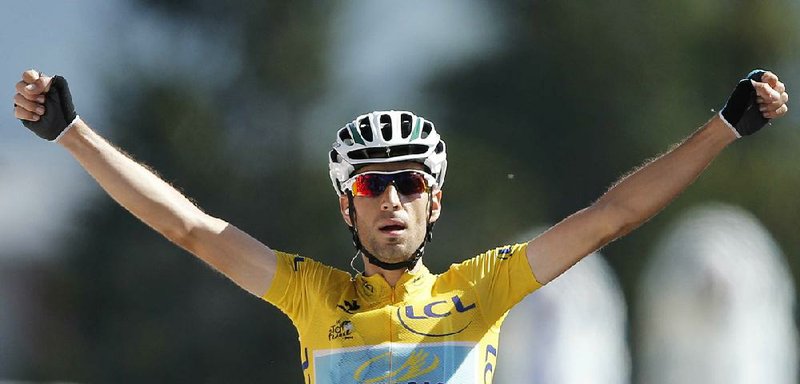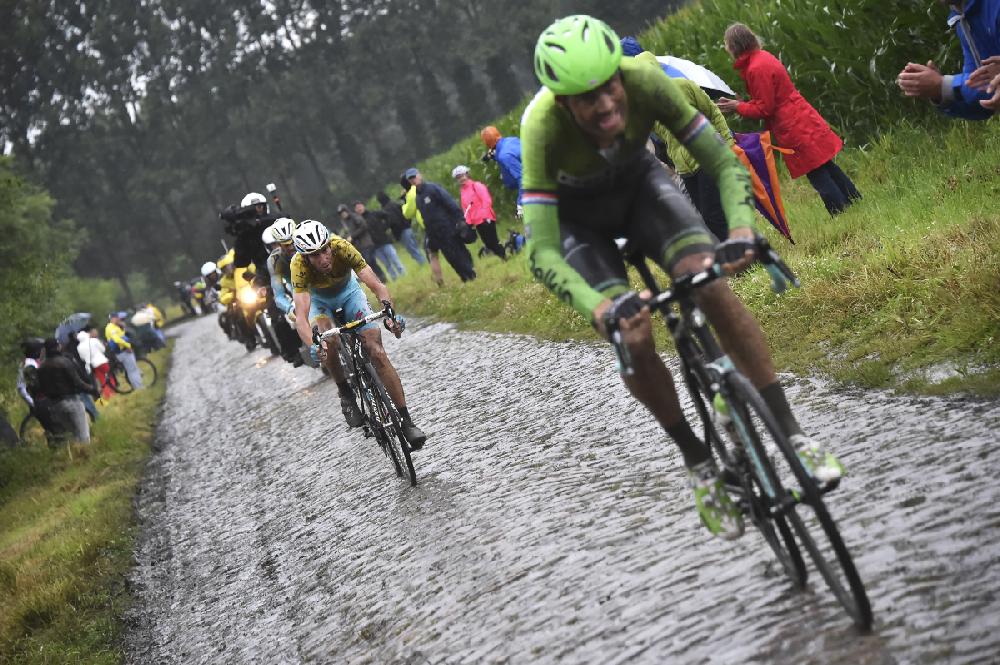CARCASSONNE, France -- Barring a disaster for him on French roads from now until Sunday, the man who looks set to win the Tour de France says he understands that cycling is still paying for its longtime doping plague.
Italy's Vincenzo Nibali knows that more than many. Both of cycling's other "Grand Tours" that he has already won were marred by doping cases. Last year's Giro d'Italia was tarnished by three positive tests while in the 2010 Vuelta Nibali's runner-up, Ezequiel Mosquera, later tested positive for a masking agent that can hide blood-booster EPO -- long cycling's designer drug.
But on Monday's rest day before the pack heads to the Pyrenees, the serene, talented and methodical 29-year-old Italian was focusing on the race, saying he wants to make sure he avoids a "crisis" like the crashes that forced out rivals 2013 Tour champ Chris Froome and two-time winner Alberto Contador. In post-stage news conferences, he has confidently fielded and answered questions about doping.
"Unfortunately, those questions arise because we're paying [for] the past years. I try to answer in the most correct way, like I already did at the Giro last year," Nibali said after Sunday's Stage 15. "I'm here to give the best answers I can, and clarify everything about myself."
"I've always been a flag-bearer of anti-doping."
As the race embarks today on three days in the Pyrenees mountains, Nibali leads Alejandro Valverde -- a 34-year-old Spaniard who once served a two-year ban after being implicated in a blood-doping ring -- by 4 minutes, 37 seconds. Romain Bardet is third, 4:50 back, and fellow Frenchman Thibaut Pinot is fourth: 5:06 behind. American Tejay van Garderen is fifth, 5:49 back.
A few components go into the calculation to understand those gaps, after more than 66 hours of total racing since the Tour's start in Yorkshire, England on July 5. They include Nibali's nearly indomitable performance in the mountains, which often prove crucial to separating the strong contenders for the Tour title from the rest of the pack; his relative strength in the time trial, which looms on the next-to-last race day; and the luxury that Nibali has: To focus on the few riders who could threaten him.
If any one of them tries a breakaway in the coming days, expect Nibali and his strong Astana team to lay chase. He'll be keeping close watch in today's 147.5-mile Stage 16 from Carcassonne to Bagneres-de-Luchon in the Pyrenees. It's the longest stage this year and features the punishing Port de Bales climb.
In this race, Nibali has shown maturity -- by cannily winning Stage 2 -- and exceptional bike control, such as over the cobblestones in Stage 5. In that stage, Froome crashed out due to injury and Nibali nibbled more than 2 minutes on Contador, forcing the Spaniard to start contemplating how to attack. Five stages later, he also crashed out.
"Over the years, I've really learned a lot from all the big races: That every second counts," Nibali said. "You can never know."
Those who know Nibali well says he combines innate cycling skill, a well-honed physique and a tough training regimen.
"We still need to win the Tour but we're in a good position," Paolo Slongo, Nibali's longtime trainer, said at the team's hotel Monday. "There's a lot of work behind winning a Grand Tour ... there are no strange recipes."
Nibali, a native of Messina, Sicily, called Slongo "the person who knows me best." The trainer said something was trigggered in Nibali's mind after he was unhappy with his performance in the time-trial at the Tour de Romandie in Switzerland about three months ago.
"Vincenzo was dropped at the Romandie on the climb by Froome," Slongo said of the Swiss race. "Being Sicilian -- Sicilians are full of pride ... he said, 'OK, now I've got to really prepare perfectly, because I wasn't competitive here and that's not OK.' "
Nibali took 5 days off to rest, then followed that up with eight to 10 weeks of physical preparation and two weeks of altitude training in Teide -- a mountain in the Canary Islands favored by many pro cyclists.
After last month's Criterium du Dauphine, Slongo worked with Nibali on his pedal cadence and diaphragm breathing, among other things.
"There are a lot of elements involved, it's not just riding the bike," Slongo said. "We took care of everything to be super-competitive."
"Vincenzo has natural abilities," Slongo added. "What we've done with his natural talent is add specific scientific training to reach 100 percent in the Grand Tours."
Nibali said Monday: "It was a long road to reach this point. It was a long road to realize my childhood dreams. It wasn't easy, because year after year after year I had to start from zero, because that's how it is at the start of the season."
"I was also fortunate to have the right people around me from the start," Nibali said.
One of those people around him is Alexandre Vinokourov, a former Kazakh rider who is now general manager of Astana. "Vino" -- as he was known to many adoring fans during his career -- was beside Nibali at the news conference on Monday.
Vinokourov, like Lance Armstrong and Floyd Landis, was one of the biggest-name riders involved in doping in the 2000s. He was kicked out of the 2007 Tour and his entire team -- Astana -- was sent home after he tested positive twice for blood doping in that scandal-marred race edition.
Like 1996 Tour winner Bjarne Riis, who admitted to doping a decade later and is now Tinkoff-Saxo Bank manager, Vinokourov remains active in pro cycling -- unlike Armstrong and Landis.
Vinokourov didn't address what lessons he might have learned from his 2007 Tour, saying he's done it before. He noted that Astana is now one of the teams in the Movement for a Credible Cycling, which goes beyond what cycling's governing body, UCI, requires in the fight against doping.
"Today, I think we have done the maximum, and cycling has changed for the last 5-6 years. You can see it on the roads, there are young riders coming up, and it's great," said Vinokourov.
"As I have said before, that's the strategy of our team: 100 percent without doping, and I believe that, until now, we've followed all the rules," he said. "But if we are here, it's to win."
Sports on 07/22/2014

